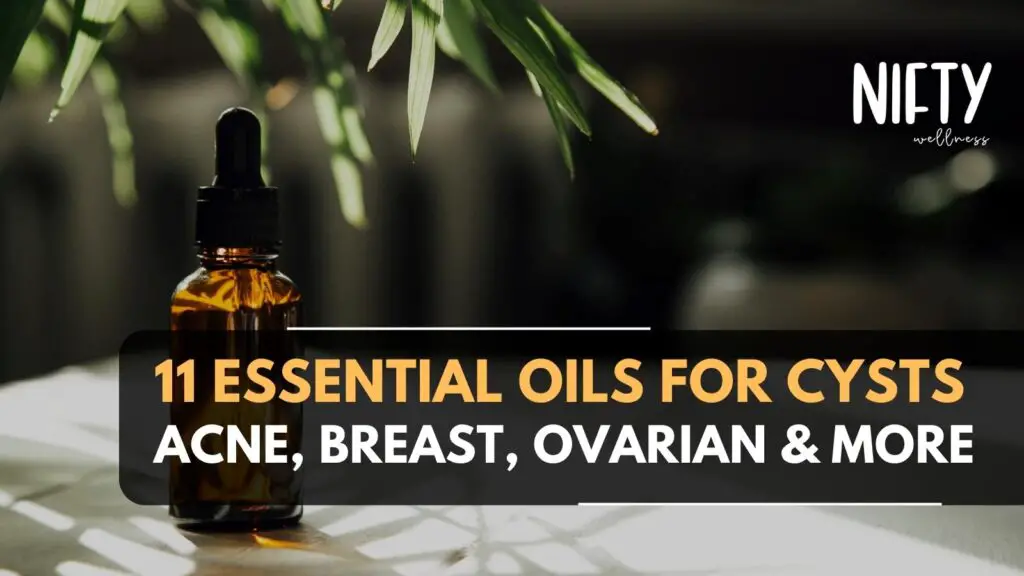Are cysts causing you discomfort and concern? You’re not alone. Many individuals grapple with cyst-related issues, from acne troubles to more complex breast and ovarian cysts. But fear not, for nature has provided a potential solution: essential oils. This blog will help you explore essential oils and how they offer relief and support in managing cysts. So, if you’re seeking natural remedies to ease your cyst-related woes, join us on this aromatic journey of discovering essential oil for cysts.
What Are Cysts?
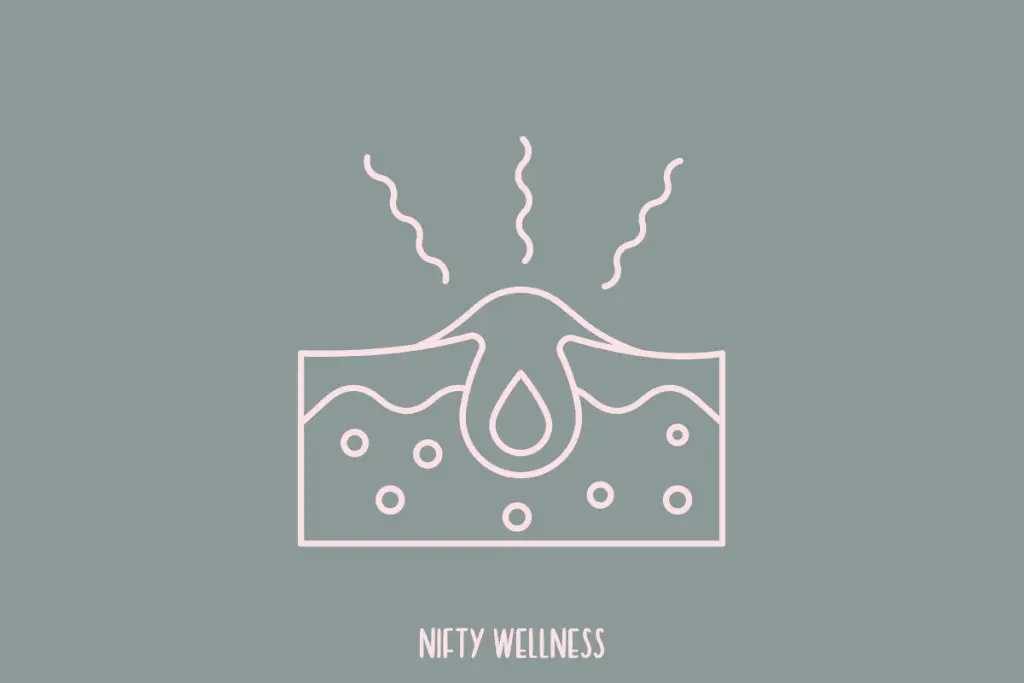
A cyst is a closed sac-like pocket of membranous tissue that contains air, fluid, semisolid or gaseous material, and other substances.
These blister-like skin conditions can grow nearly anywhere on the body and under the skin but occur most frequently in the skin, ovaries, breasts, and kidneys.
Most cysts are non-cancerous, but they are not a normal part of the tissue. A cyst has a distinct membrane and is separated from nearby tissue.
Cysts are not filled with pus unless they are infected; in that case, they are referred to in medical terms as an abscess. Treating a cyst depends on several important factors, such as:
- The type of cyst.
- The location of the cyst.
- If the cyst is painful and causing discomfort.
- Whether or not the cyst is infected.
Benign Versus Malignant Cysts: What’s the Difference?
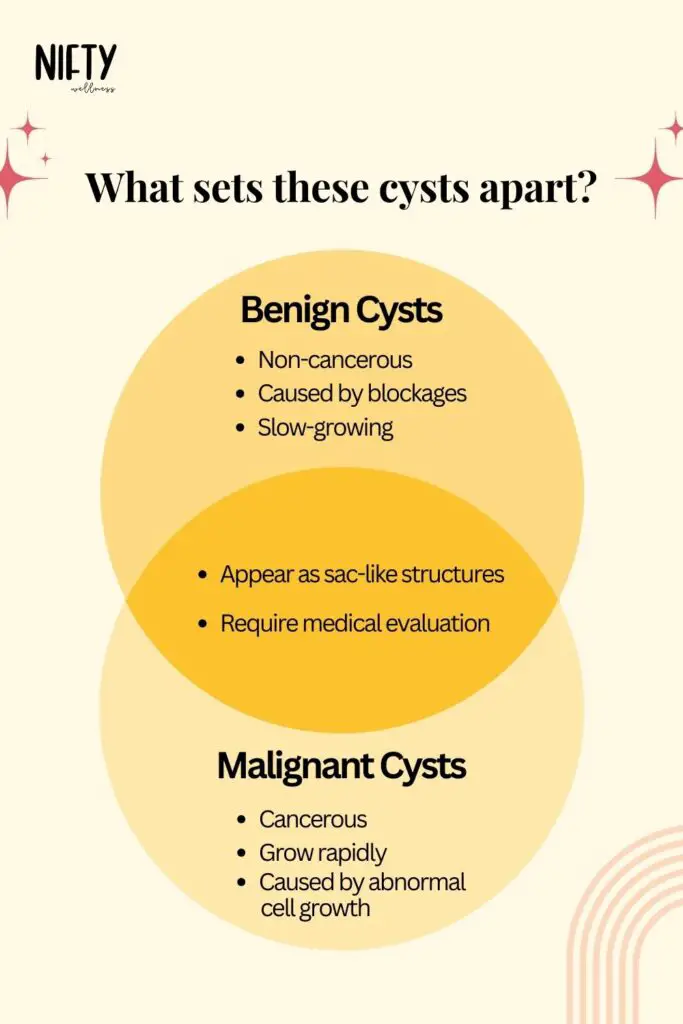
Most cysts are benign or non-cancerous and are only the result of a blockage in the body’s natural drainage systems.
However, some cysts may be malignant (cancerous) or precancerous. While some cysts may be tumors formed inside other tumors, they are not the same as tumors.
Tumor Versus Cyst: What’s the Difference?
A cyst, defined as a sac filled with air, fluid, or other material, is non-cancerous.
However, certain cancers can cause cysts. A tumor is defined as an abnormal mass of tissue or swelling. Like a cyst, a tumor can form in any part of the body and be either benign or malignant.
Common Types Of Cysts
There are many types of cysts, some being more common than others. Here is a brief list of some common cyst types.
Acne Cysts: Often known as cystic acne, these cysts are a severe type of acne that occurs when the skin’s pores become blocked, infected, and inflamed. Cystic acne usually occurs on the face but can also affect the chest, back, and upper arms.
Breast Cysts: These cysts are fluid-filled sacs that can easily move underneath the skin. Breast cysts are common and, while painful, usually do not require treatment and can often disappear on their own.
However, according to the American Cancer Society, these simple cysts do not increase one’s risk of breast cancer. A person with many breast cysts is said to have fibrocystic breasts.
Ovarian Cysts: Ovarian cysts form on the ovaries, typically around the time of ovulation, and are common in females who have regular periods. They are harmless and cause relatively no symptoms.
Sebaceous Cysts: The term “sebaceous cyst” is used to describe a type of cyst that develops on the skin of the face, back, scalp, or scrotum. Skin cysts are slow-growing and are usually small and painless unless they are ruptured or inflamed.
Are Essential Oils Good For Treating Cysts?
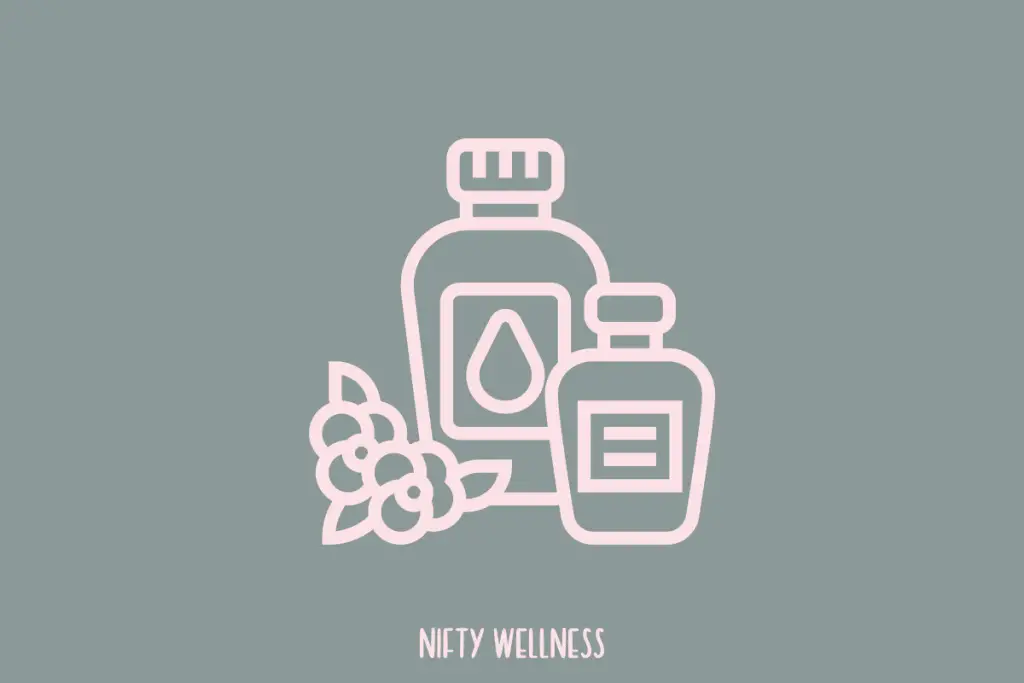
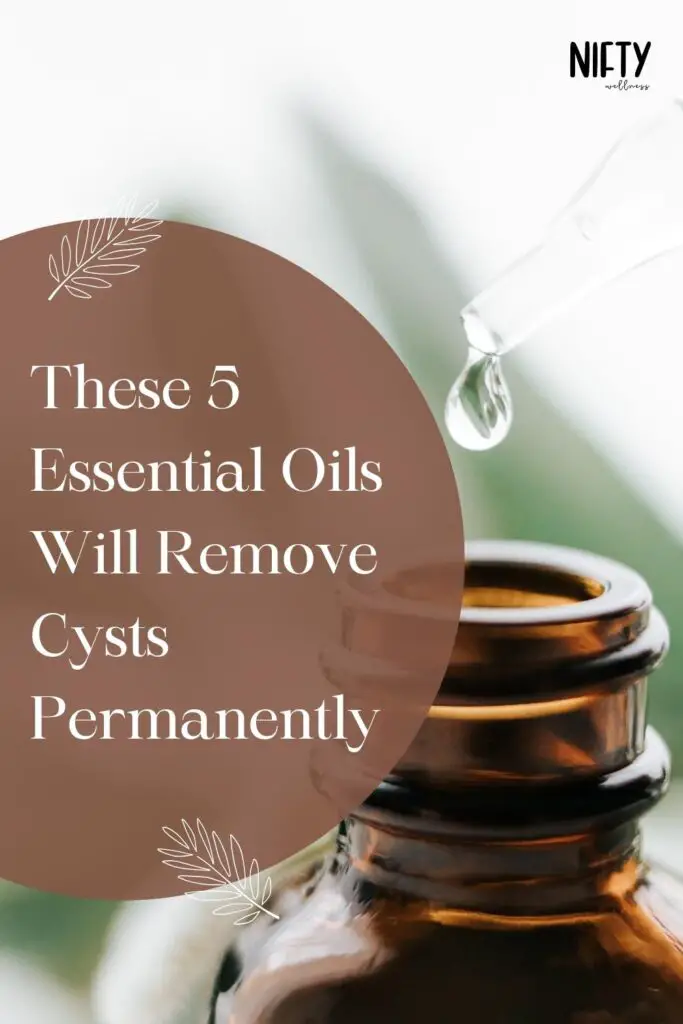
Essential oils can be an exceptional treatment option for many cysts as they are often more gentle and safe for the skin than conventional products with harsh chemicals and irritants.
Essential oils can also promote mind-body connection.
By easing stress, negative thoughts, and balancing hormones, essential oils can provide a holistic experience and approach to treating skin conditions like cysts and underlying problems contributing to their development.
However, while essential oils can be effective home remedies in treating cysts, it is best to consult your doctor if the cyst or cystic condition is bothersome, painful, fast-growing, or is infected.
Shaving can be a chore, but with the right aftercare, it becomes a luxurious experience you’ll look forward to. Read our latest blog “The Ultimate Guide To Oils For After Shaving: Achieve a Smooth and Nourished Skin“.
Essential Oils For Cystic Acne
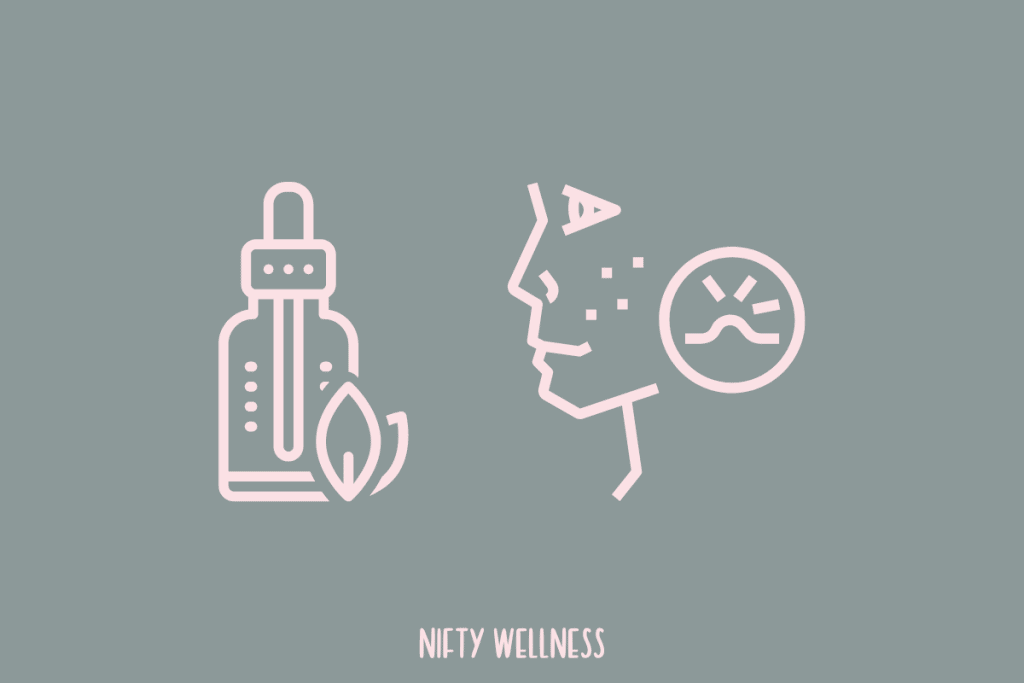
Cystic acne is one of the most persistent skin challenges that many individuals face. Finding an effective solution can sometimes feel like an uphill battle. Fortunately, there’s a natural approach worth exploring – essential oils. Essential oil for cystic acne are natural extracts that offer a holistic path to achieving clearer and healthier skin.
Lavender Essential Oil
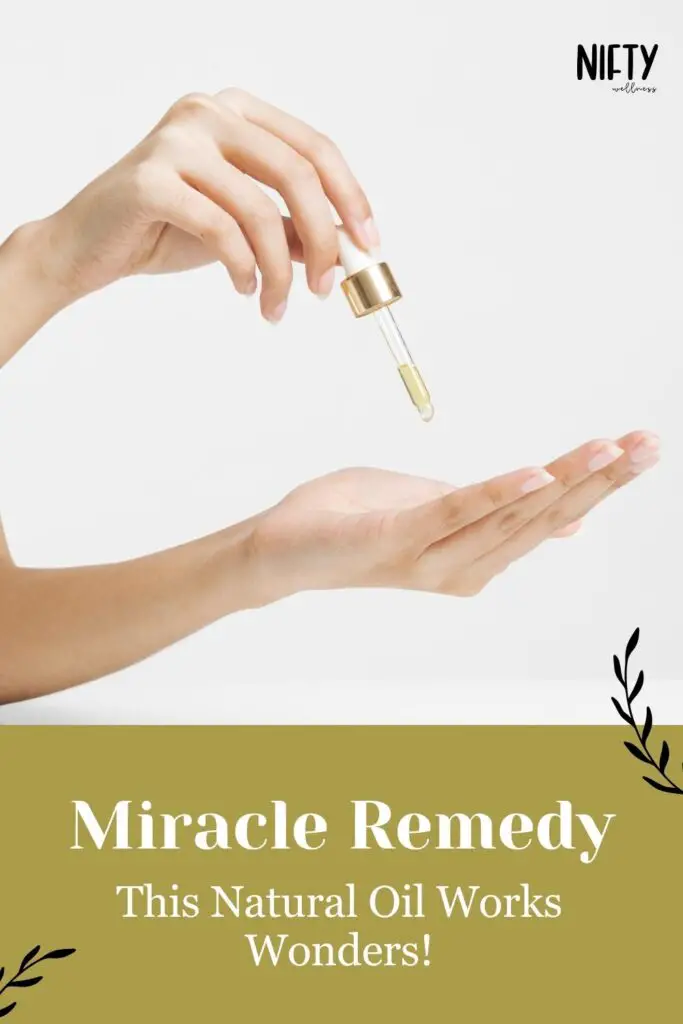
Lavender essential oil is a natural, anti-inflammatory oil that soothes the skin. Lavender’s antimicrobial properties also decrease surface bacteria on the skin and prevent bacterial growth, infection, and blemishes.
Lavender is one of the best essential oils for stress-induced acne. Though nearly all acne is caused by inflammation, bacteria, and excess oil production, researchers also believe stress is a common trigger for acne.
Thus, lavender essential oil can also be used for its aromatherapy benefits to control stress hormones like cortisol that has been linked to inflammation and acne.
(Natural teas can also help fight inflammation, check out our articles about unique natural teas such as genmaicha or kukicha.)
Tea Tree Essential Oil
The Tea Tree essential oil is derived from the leaves of the Melaleuca alternifolia plant. Tea tree is an essential oil commonly used for acne as it kills acne-causing bacteria, reduces inflammation, and can influence excess oil production. Tea tree oil for cysts offers a gentle but effective approach to soothing and healing problematic skin, making it a valuable addition to any skincare routine. However, if you have specific concerns or sensitivities, consult a healthcare professional or a dermatologist before using tea tree oil on cyst.
The oil’s ability to calm inflammation and fight pore-clogging bacteria is instrumental when treating cystic acne.
Geranium Essential Oil
Geranium essential oil is a popular oil for reducing inflammation. It is a floral-scented oil with impressive skin-enhancing qualities. When it comes to cystic acne, geranium oil can reduce the spread and development of bacteria and reduce the pain and swelling of cystic pimples. Its astringent properties help tighten the skin while reducing the appearance of enlarged pores, making it an excellent choice for managing cystic acne.
Geranium oil also boasts anti-inflammatory benefits, which makes it a crucial part of natural skincare, promoting healthier and more radiant skin.
Check out our blog Oils for Low Porosity Hair: Essential Oils, Carrier Oils & Secrets to Healthy and Vibrant Hair and explore our top oils perfect for your hair.
Essential Oils For Breast Cysts
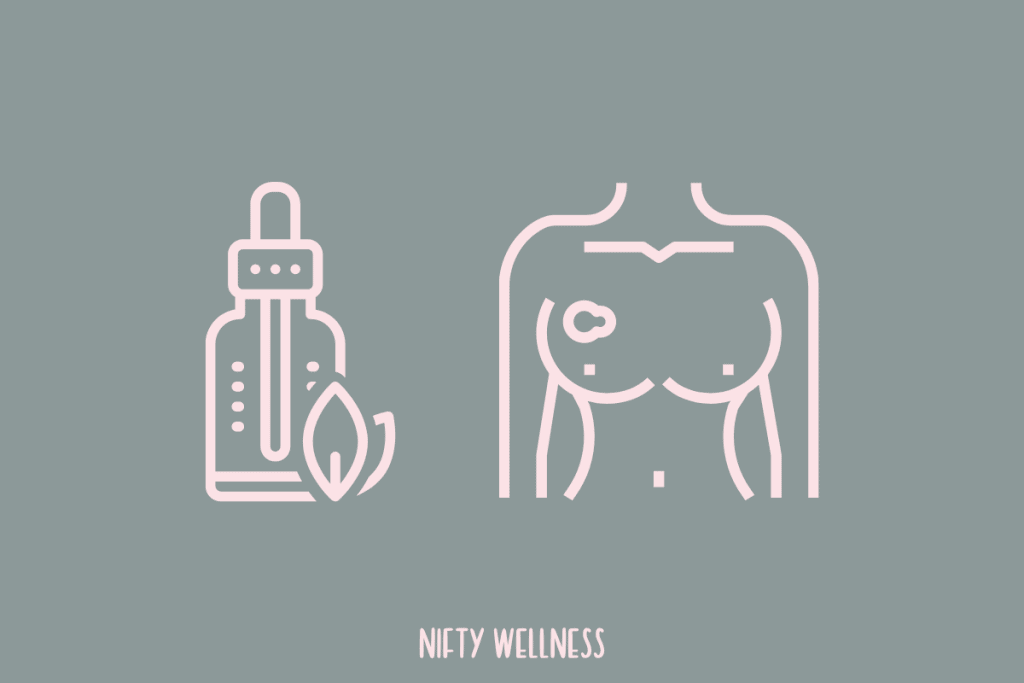
Several essential oils, including clove, frankincense, rosemary, lemon, jasmine, cinnamon, rose, roman chamomile, and thyme have proven effective in inhibiting breast cancer.
This research suggests essential oils and aromatherapy can be practical tools in promoting overall breast health.
Frankincense Essential Oil
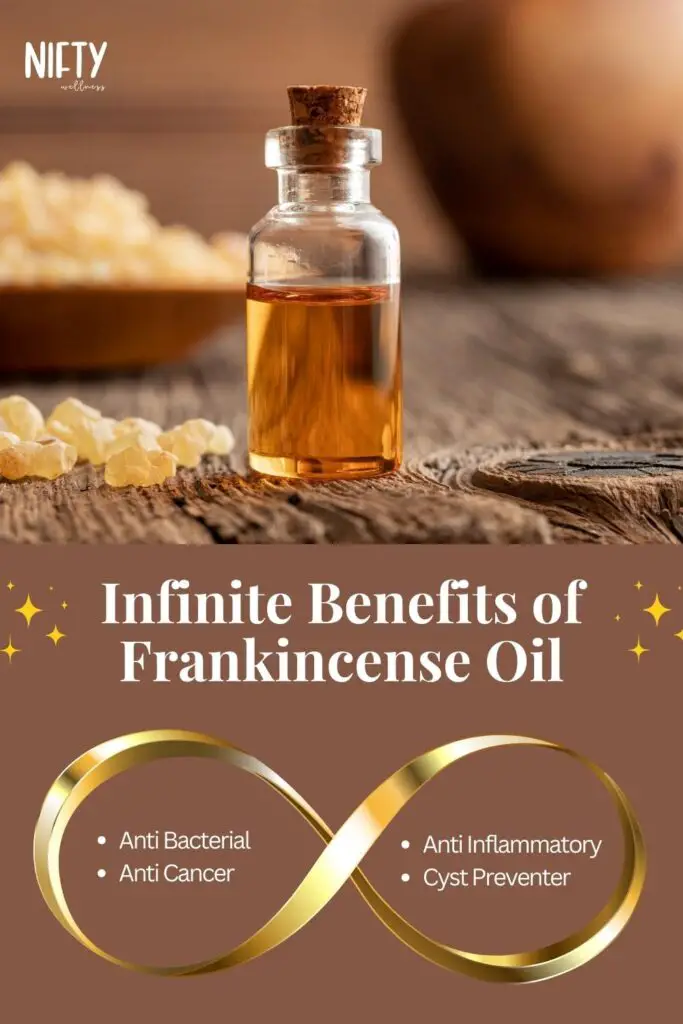
Frankincense is an effective essential oil in treating cysts. It may work incredibly well on breast tissue and cysts as it is shown to have anti-inflammatory, antibacterial, and anticancer capabilities.
A 2017 study found frankincense essential oil to be a successful therapeutic agent for suppressing tumor progression in breast cancer.
Frankincense is a fantastic oil to use for breast massage to promote lymphatic drainage and discourage the formation of breast cysts.
Lavender Essential Oil
Lavender is another essential oil that supports the lymphatic system and breast health. The lymphatic system is vital for circulating lymph fluid throughout the body, removing toxins and other harmful substances.
This is especially important in promoting overall breast health and preventing the development of cysts as the lymph tissue within the breasts and surrounding lymph nodes should be effectively removing toxins.
Combining lavender oil with a carrier oil of your choice and gently massaging the breast tissue and surrounding area can promote circulation and detoxification within the tissue helping to heal benign breast cysts and ease tenderness and pain.
Rose Essential Oil
Famous for its delightful fragrance, Rose essential oil offers therapeutic benefits for breast cysts. Rose essential oil can be a healing, soothing, and self-loving treatment for breast cysts.
Mixing two to three drops of rose oil with a carrier oil like jojoba oil or shea butter and massaging it into the breast tissue may promote the detoxification of toxic and harmful substances in the internal breast tissue.
Its anti-inflammatory properties can help reduce the swelling and discomfort of breast cysts. Incorporating rose oil into a warm compress or diluted massage oil may provide relief and promote overall breast health, making it a soothing and aromatic choice for those with this problem.
Essential Oils For Ovarian Cysts
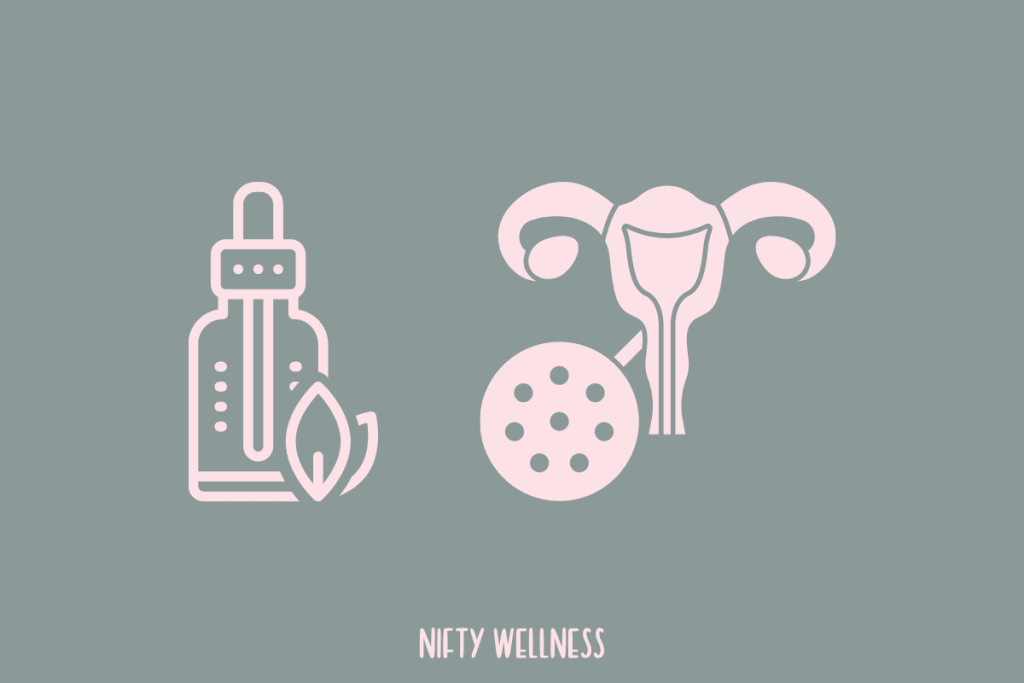
Dealing with ovarian cysts can be challenging, but essential oils offer a natural solution. Ovarian cysts are a common issue that can cause discomfort and worry for many women. Essential oils relieve pain, support hormonal balance, and promote ovarian health. With some assistance from nature, one might find relief from those troublesome cysts.
Geranium Essential Oil
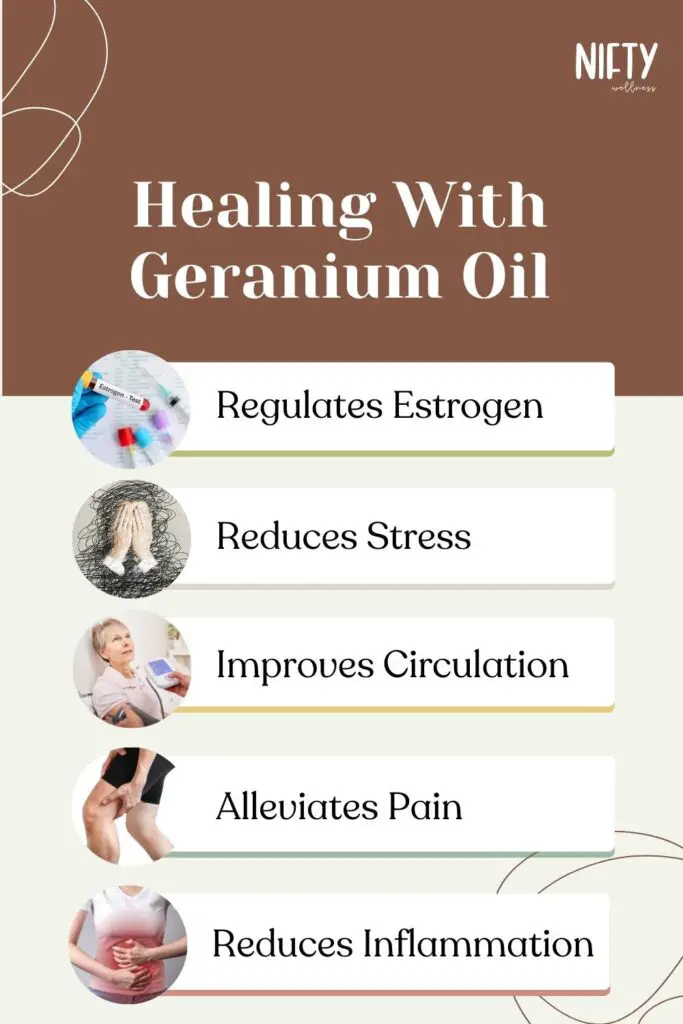
Geranium essential oil is one of the most reached for oils when it comes to healing and soothing ovarian cysts. This essential oil is believed to restore hormone equilibrium, helping your body return to its natural state of order.
It also relieves stress and feelings of anxiety, reduces inflammation, and improves circulation.
Clary Sage, Lavender & Rose Essential Oil
This harmonious blend of oils can support women with ovarian cysts as they have been shown to mitigate pain in the abdomen and uterus.
One small clinical trial examining the effects of clary sage, lavender, and rose (a ratio of 2:1:1) in an almond carrier oil, found that those who received the aromatherapy had less menstrual cramps.
This study suggests that this blend of oils can reduce pain and inflammation when massaged into the abdomen or used as aromatherapy.
Essential Oils For Sebaceous Cysts
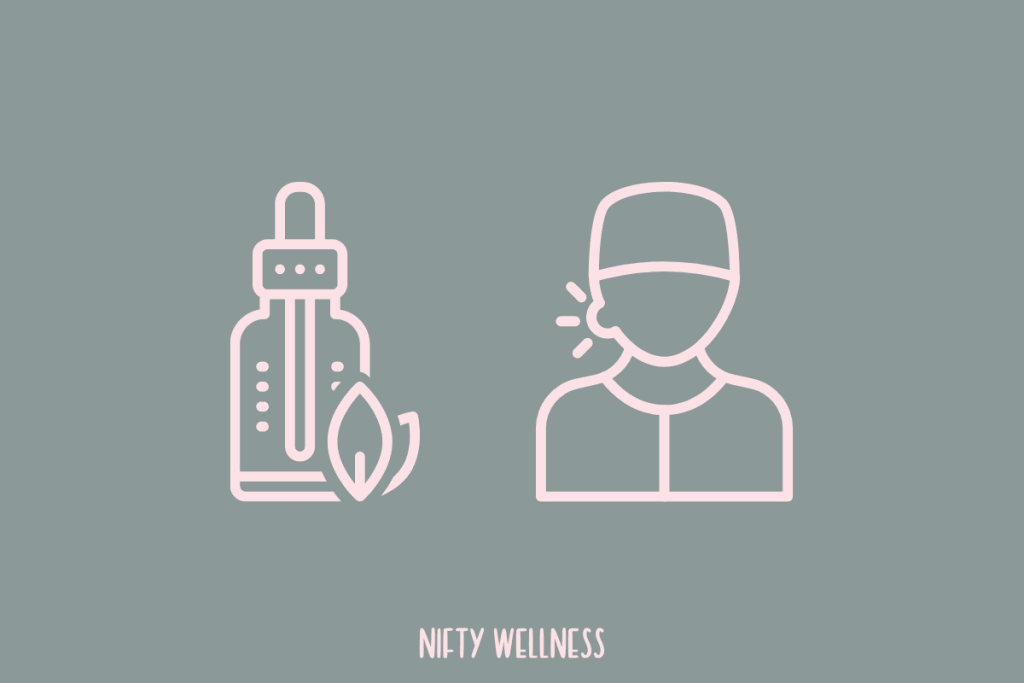
If you’re grappling with sebaceous cysts, consider using essential oils for a natural solution. Sebaceous cysts may be bothersome, but essential oils can provide soothing relief, regulate your skin’s oil levels, and contribute to overall skin wellness. With essential oils, let the goodness of nature lend a hand in your quest for comfort and healthier skin.
Frankincense Essential Oil
Frankincense is a highly astringent essential oil that is beneficial for treating wounds and could thus help treat a sebaceous cyst. This gift of nature works wonders for sebaceous cysts. This gentle astringent can protect your skin while encouraging the cyst to shrink in size. It can soothe the discomfort and help your skin heal, making it a valuable companion in your skincare journey.
Grapefruit Essential Oil
Grapefruit is a potent and useful oil when it comes to treating sebaceous cysts. Grapefruit essential oil can help break down fatty substances and encourage the build-up fluid inside the cyst to drain.
This oil is also antimicrobial and can help prevent infection and promote healing. To use grapefruit oil on the sebaceous cyst, dilute a drop of this essential oil with a carrier oil and gently apply it to the cyst once per day.
Tea Tree Essential Oil
Tea tree is an excellent essential oil for treating sebaceous cysts as it is antibacterial, anti-inflammatory and have been shown to help various ailments, including acne and sebaceous cysts.
Tea tree may be particularly beneficial for those cysts caused by ingrown hairs. To use tea tree oil on the cyst, mix a drop or two with a carrier oil and apply it to the cyst to help treat and prevent infection.
Conclusion
In conclusion, essential oils can be powerful allies in managing various cysts, including acne, breast, ovarian, and sebaceous cysts. These natural oils offer gentler and safer alternatives to conventional treatments, often laden with harsh chemicals.
However, it is important to note that while essential oils can be effective, consulting a healthcare professional for bothersome, painful, rapidly growing, or infected cysts is crucial. These natural remedies can complement your health journey, offering a holistic approach to managing cysts and their underlying causes.
Frequently Asked Questions

What Causes Cysts?
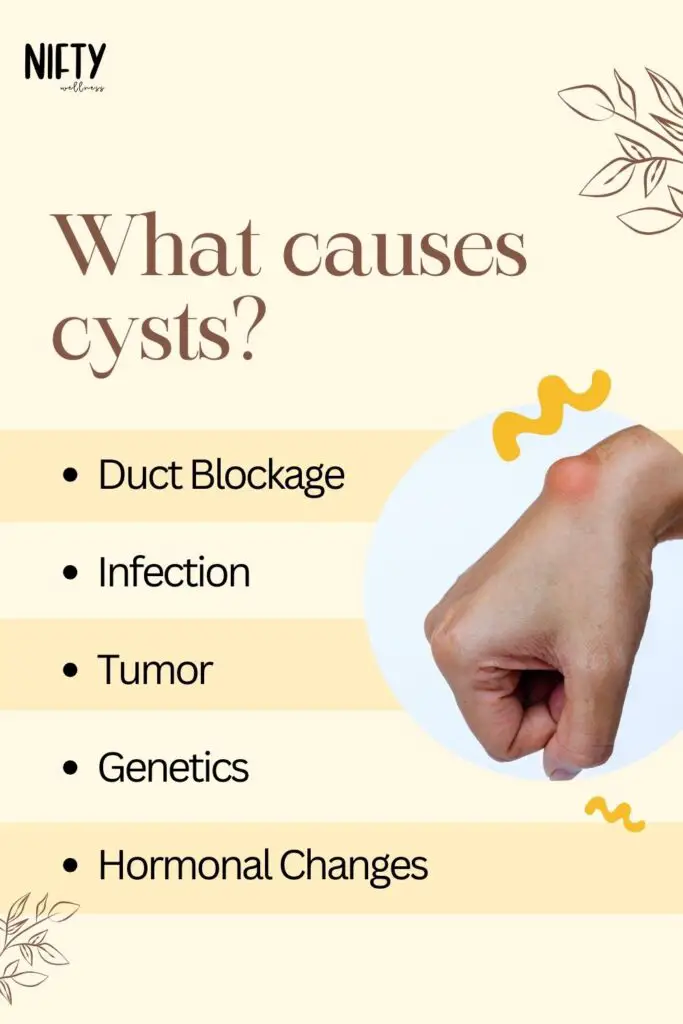
Cysts are commonly a result of an infection, a clogged sebaceous gland, or piercing. Other causes of cysts include:
- Injuries.
- Cell defects.
- Genetics.
- Tumors.
- Blockages of ducts in the body that cause fluid to build-up.
- An injury that breaks a blood vessel.
- A parasite.
- Chronic inflammatory conditions.
- A fault in an organ of a developing embryo.
What Does a Cystic Pimple Look Like?
A cystic pimple will be a large, pus-filled cyst that looks similar to a boil. They are often painful and can easily scar.
Can You Pop Cystic Acne?
In general, popping pimples is damaging for your skin, but you should especially never pop or pick at a cystic pimple. This can be extremely painful and detrimental to your skin and cause long-lasting scars or infections.
Besides, most cystic pimples are impossible to squeeze out with your fingers alone since they can live deep beneath the skin.
What Are the Best Essential Oils for Cystic Acne?
In short, some of the best essential oils for treating cystic acne are tea tree, lavender, and geranium. Other essential oils such as rosemary, rose, and thyme may also help treat and soothe acne.
Is Peppermint Oil Good for Cystic Acne?
Peppermint essential oil is beneficial for cystic acne as it can reduce swelling, inflammation and reduce redness.
Its antimicrobial properties may also help kill acne-causing bacteria. However, peppermint essential oil works best when paired with other oils or acne treatments.
Is Tea Tree Essential Oil Good for Cystic Acne?
Tea tree is an effective antimicrobial and anti-inflammatory agent known to help treat some cysts, including cystic acne. Tea tree oils kill off bacteria that contribute to acne and cysts.
Does Frankincense Help Cysts?
There have been numerous accounts linking the use of frankincense essential oil as an effective treatment for ganglion cysts.
A ganglion cyst is a common, harmless cyst that appears along the tendons or joints, specifically in the hands, wrists, ankles, and feet.
Are Cysts Dangerous?
Most cysts are benign and not harmful to the body. Some are painful, while others are painless.
However, some cysts can be cancerous or precancerous and need immediate treatment. Infected benign cysts or abscesses can also be dangerous, especially if one bursts in the body, as this could lead to blood poisoning.
Is A Cyst A Benign Tumor?
By definition, a cyst is not a benign tumor. However, most cysts are benign, and some cancers can cause the formation of a cyst.
How Common Are Breast Cysts?
Breast cysts are prevalent, affecting nearly one-third of women between the ages of thirty-five and fifty.
Other studies have reported breast cysts in fifty-percent of women who attend breast clinics. While breast cysts can affect women of any age, they are most common in women between forty-five and fifty.
Do Benign Breast Cysts Go Away?
Benign breast cysts tend to go away over time and require no treatment. Breast cysts that occur from menopause tend to go away afterward but can sometimes last throughout a woman’s life.
If a breast cyst is particularly painful or burdensome, seek the advice and treatment of a doctor.
How Do You Get Rid Of A Cyst Fast Naturally?
In addition to using supportive essential oils, cysts can be treated at home with heat compression and natural ingredients such as witch hazel and castor oil, which are antimicrobial and can help soothe inflammation.
